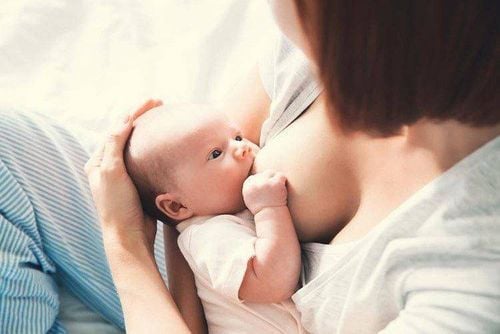This is an automatically translated article.
Posted by Pharmacist Nguyen Thi Bich Phuong - Clinical Pharmacist - Faculty of Pharmacy - Vinmec Ha Long International Hospital
Lactating women need to maintain a healthy and adequate nutrition regimen to ensure milk quality and recover quickly after giving birth. So, what are the factors that need to ensure nutrition for nursing mothers?
1. Nutritional overview in lactating women
Breastfeeding women increase their need to use calories and nutrients to maintain their nutrition during weight loss after gaining weight during pregnancy. Accordingly, women who exclusively breastfeed their children need an extra 500 calories per day to produce milk for their babies as well as meet the nutritional needs of the mother.
For women who are not getting the daily recommended calories and nutrition, there may also be no impact on daily milk production. However, milk quality will be affected due to insufficient amount of some vitamin and mineral components such as vitamin A, thiamin (vitamin B1), riboflavin (vitamin B2), vitamin B6, selenium, iodine). Women who do not get enough vitamins and minerals through their diet may need to supplement with supplements .
Nutrition needs to be supplemented in women during the following stages:
From birth to 6 months: 330 calories more/day than non-breastfeeding women. 6 months to 12 months postpartum: 400 calories more per day than non-breastfeeding women. For women with a healthy body mass index (BMI) and average height, total energy needs are 2100-2700 calories/day during the first 6 months postpartum and 2200-2800 calories/day thereafter. , depending on your age, weight, and activity level.
Water intake: On average, breastfeeding women produce about 750ml of milk/day. Many women do not know how much water to replenish to compensate. In general, you need to drink according to your daily needs when thirsty, watch for symptoms of excessive dehydration such as dry mouth, dark urine, little urine.
SEE ALSO: Postpartum nutrition for nursing mothers

Chế độ dinh dưỡng cho phụ nữ mang thai và cho con bú
2. Weight loss in lactating women
After giving birth, women tend to gradually lose the weight they gained during pregnancy. Moderate weight loss by eating less and increasing exercise and regular activity will have little effect on the amount of breast milk produced.
SEE ALSO: What to eat to make breast milk thick, cool, and gain weight?
3. Vitamins and minerals in lactating women
If you're a healthy person and eat a balanced diet that includes meat and fish, you may not need extra vitamins while breastfeeding. However, if your diet is not balanced and doesn't include enough essential vitamins and minerals, you can take a multivitamin supplement. Experts recommend that, whether you are breastfeeding or not, you still need to ensure the amount of calcium and vitamin D you put into your body.
Some nutrients that nursing women need to supplement are as follows:
Calcium: Pregnancy and breast-feeding reduce bone density temporarily, but will recover when you stop breastfeeding. A woman should consume a minimum of 1000 mg of calcium/day before, during pregnancy and while breastfeeding. Food sources of calcium that nursing women need to supplement include milk, yogurt, cheese, green leafy vegetables, eggs... Vitamin D: Calcium absorption depends on proper vitamin D intake. Both normal and lactating women need 600 units of vitamin D per day. The American Academy of Pediatrics (APP) recommends that all breastfed babies need 400 units of vitamin D per day early after birth because the amount of vitamin D excreted in breast milk is quite low, even though the mother has supplemented with 600 vitamin D units/day. In fact, vitamin D can form when a baby's skin is exposed to sunlight, but experts recommend that children should not be exposed to direct sunlight to reduce the risk of skin cancer in the long term. Iron: Iron deficiency is one of the common causes of anemia. Women who do not have postpartum anemia may not need iron supplements. Avoid excessive iron supplementation, leading to constipation and discomfort. Women with postpartum anemia often need iron supplements (either a separate iron product or a multivitamin that contains the required amount of iron). Iodine: The American Thyroid Association (AIP) recommends that breastfeeding women take a multivitamin containing 150mcg of iodine daily in addition to iodized table salt. This recommendation is based on the recommended daily intake of iodine in lactating women of 290 mcg/day. The main risk factors for iodine deficiency are diets without iodized salt or dairy products. Omega-3: The AAP recommends that breastfeeding women get 200-300mg of omega-3 fatty acids per day. You can meet this need by eating one to two servings of fish per week: herring, canned tuna, and salmon. To minimize mercury exposure, mothers should avoid fish such as shark, swordfish, mackerel, tilefish because of their high mercury content.

Omega-3 trong chế độ dinh dưỡng cho mẹ cho con bú
In addition to the recommended nutrients, breastfeeding women also need to limit some foods and drinks such as alcohol, caffeine, and tobacco. Besides, when using any medicine while breastfeeding, you need to clearly state your medical condition, the reason for taking the medicine as well as consult your doctor to avoid affecting the baby and the amount of milk secreted. If you still have doubts about nutrition during this period, you can learn about the nutritional pyramid for mothers after giving birth and breastfeeding to both help keep their bodies healthy and ensure the quality of milk for their babies. .
Please dial HOTLINE for more information or register for an appointment HERE. Download MyVinmec app to make appointments faster and to manage your bookings easily.
References:Patient education: Maternal health and nutrition during breastfeeding, Update accessed on February 27, 2021













